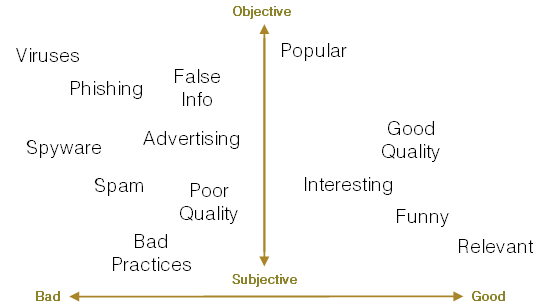stan's blog
TipMonkies, and the growth continues
Submitted by stan on Sat, 2005-05-14 02:02.The user base is continuing to grow, and has now crossed the 100 mark. 70 hits on del.icio.us, and scattered technoratti links.
Very cool review at TipMonkies. Thanks guys!
Monkey Influx
Submitted by stan on Thu, 2005-05-12 16:24.Fabian posted a link to Outfoxed on Monkeyfilter yesterday. The responding posts were underwhelming and knee-jerkish, but the post resulted in at least 15 new testers who have already created pages full of data. I'm finding it impossible to construct a google search that doesn't return at least one page rated by someone in my network!
But it's clear that Outfoxed has an image problem. So I'm creating a flash movie, inspired by by Jon Udell's screencasts which will do a virtual walkthrough of it's features.
TrustRank?
Submitted by stan on Sun, 2005-05-08 16:57.Just saw this post on slashdot. Hmmm...I wonder what Google is up to with trust?
Outfoxed music
Submitted by stan on Sun, 2005-05-08 14:23.My friend Fabian used his new PowerBook to create a jingle/rap for Outfoxed. I believe this makes it the first Firefox extension to have a theme song? :)
Listen to it now (mp3, 2.1MB)
(Server busy? Try the mirror.)
Visualization by Mo, and accessibilty possibilities
Submitted by stan on Fri, 2005-05-06 22:25.Moritz might have time to whip up a flash movie that can visualize users' informer networks. Now that would be really cool!
He also told me about some contract work he's doing for a company that provides movies in a sidebar of a sign-language interpretation of the page's content. That got me thinking about accessibility in general, and how users with a disability would certainly have different criteria when doing a web search: what good is the top ranked Google search result to a blind person if most of the text content is in images? I could see people with various disabilities rating pages based on their accessibility, and then benifiting from having the accesible pages promoted within search results.
The good, the bad, and the subjective.
Submitted by stan on Tue, 2005-04-26 23:21.Working on the presentation for tomorrow to the Infomatik group. Came up with a nice diagram about rating stuff on the internet. (Or anywhere in info-space, I suppose)

- It's easier to be objective about poor quality. No one will that phishing sites or viruses have redeeming qualities. This is the domain of virus-checkes and spyware detection programs.
- For high quality, the best objective measure is popularity. This is the domain of search engines, and reviewing systems like those in Amazon or Epinions.
- For "intesting" and "funny", the best sytems so far try to distill popularity information by some pattern-matching algorithms. This is the domain of stumbleupon. (Although del.icio.us does this to some extent too.)
- The holy grail of search is to find items which are subjectivly good. These are items which are completely relevant to what the user is currently wanting.
- ...and the holy grail of all information management is this:
To protect people from stuff that is really bad (dangerous),
hide stuff that is bad,
introduce that is good,
and help find stuff that is really good (what they're looking for).
Outfoxed is no magic bullet, but it does make a big push into the direction of the subjective. What could be a better indicator of subjective worth than the opinions of those socially closest to the subject?
Trusting DLL's
Submitted by stan on Tue, 2005-04-26 00:18.Just discovered the wonderful freeware utility listdlls, from sysinternals.com. It lists all processes that are running, and more importantly, also lists all DLL's loaded by those processes. So there you have a listing of every file that is currently loaded on the machine.
This puts me one step closer to the dream of having trust integrated into the OS. The way I see it, the OS should refuse to execute any executable/DLL that does not have a positive trust rating. Software publishers would need to provide fingerprints of their software releases, and then end users would be connected to the publishers through their social network. The usual filtering mechanisms would soon weed out any publishers who release spyware/crapware/adware/whatever.


